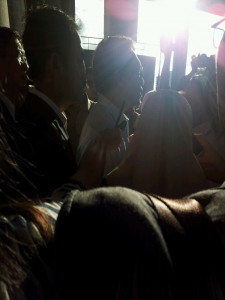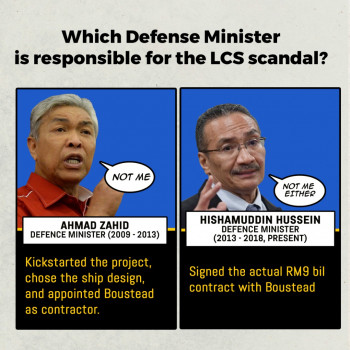by Liew Chin Tong
Three-and-half years after Saiful Bukhari Azlan made his first police report on 28th June 2008, the trial has ended today. The High Court found Datuk Seri Anwar Ibrahim not guilty of sodomising his former aide Saiful.
It is worthwhile to revisit the political context of the case, especially events that happened between April and July 2008.
Lest we forget, on March 8, 2008, Malaysian voters created a political tsunami by denying Barisan Nasional’s its two-thirds parliamentary majority and giving the Opposition five states to rule.
Rumble in UMNO’s jungle
With hindsight, the then Prime Minister Tun Abdullah Badawi is to be credited for his immediate acceptance of the electoral results in the wee hours of 9th March 2008, as seen by many Malaysians on national television.
But not all UMNO leaders agreed with him. Not only did they blame Abdullah for the disastrous outing, many thought that UMNO could have done “something” to undo the election results.
Two opposing camps advanced diverging strategies. On the one hand, the moderates accepted the fact that Malaysia was effectively a two-party state and that the Opposition was the legitimate opponent to be respected and not enemy of the state to be crushed. The hardliners advocated the reverse.
The hardliners thought they could destroy the Opposition with a three-prong strategy: eliminating Anwar from the political scene, luring PAS to join BN’s fold, and demonising the DAP as a Chinese chauvinist party to scare the Malay voters.
On April 14, 2008, at a rally at the Sultan Sulaiman Club to mark his return to active politics, Anwar added an unexpected element to the confusion. He claimed that Pakatan Rakyat could easily form the next federal government.
“We are saying here for the first time that we are ready (to rule the country). But we will only enter when the majority is comfortable,” he said. In the ensuing months, Anwar repeated the claim, which was supposed to culminate on September 16, 2008.
On May 19, 2008, another bombshell was unleashed. Former Prime Minister Tun Dr. Mahathir Mohammed quit UMNO, citing Prime Minister Abdullah as the culprit for the disastrous BN’s electoral performance.
Abdullah was pulled from both ends. Anwar was courting the moderate forces in the government to leave BN while the hardliners, who coalesced around Dr. Mahathir, were plotting to unseat Abdullah.
Datuk Seri Najib Razak, who is usually cautious, was unlikely to have made up his mind then.
How I met our Deputy Prime Minister, how we heard of Saiful
I met Najib at the 7th IISS Shangri-La Dialogue in Singapore on June 1, 2008 and had a 10-minute conversation with him before he took the podium to address the meeting.
He told me he had nothing to do with the Altantuya case, he was not a racist; and in the post-election new environment, it was time to think about cooperation with the “opposition” state governments.
When I told this brief conversation to friends who are familiar with Najib and the ruling elite, they were all stunned that the first thing Najib told a “stranger” like me was the Altantuya case. It was probably constantly on the back of his mind at that time.
On June 4, 2008, at a lengthy press conference, Abdullah announced that petrol price would go up by 78 sen, a 40.6 percent jump from RM1.92 per litre to RM2.70, while the price of diesel was raised by RM1.
Instantly, the nation was galvanised. To the rakyat, a change of government was a desired outcome, the sooner the better. Support for Barisan Nasional plummeted to even lower than during the March 2008 election.
On June 18, 2008, Sabah Progressive Party (SAPP), which has two seats in the federal parliament, annouced its departure from Barisan Nasional.
The ruling coalition looked like a sinking ship.
On June 23, 2008 when Parliament opened for its second sitting of the season, a motion on the fuel hike was presented by the Government for debate and voting. From private conversations with BN MPs, it was clear the fuel hike had caused anger and frustration among them. Switching sides to stay afloat was not too bad an idea for some.
Having a new government in office suddenly did not seem so far fetched an idea anymore.
The next thing we heard, on Saturday, June 28, 2008, one Saiful Bukhari emerged. The rest is history.
The high noon
 On July 15, 2008, Anwar debated the then Information Minister Shabery Cheek about the fuel hike on live television in his capacity as the alternative Prime Minister. It was a hands-down victory for the Pakatan Rakyat chief.
On July 15, 2008, Anwar debated the then Information Minister Shabery Cheek about the fuel hike on live television in his capacity as the alternative Prime Minister. It was a hands-down victory for the Pakatan Rakyat chief.
Indeed, it was Anwar’s first positive appearance on television in a decade since he was deposed as Deputy Prime Minister on September 2, 1998.
At midday on the following day, ten police cars, half unmarked, with twenty balaclava-clad commandos, ambushed Anwar’s car near his house and arrested him. He was the number one enemy of the state.
Thus began three-and-half gruelling years for Anwar, as BN -first under Abdullah and now Najib- tried to distract Anwar’s goal of taking over power with the flimsier case of the second sodomy charge since 1998.
With today’s verdict, BN leaders should have realised that the whole thing shouldn’t have started at all. BN’s borrowed time from Saiful’s posterior opening of the alimentary canal is over now.
Looking back, I am convinced that BN had successfully managed to use the Saiful case to thwart attempts to change the government, i.e. September 16, 2008, and to dissuade BN MPs from switching sides.
But very soon Najib and BN have to pay the price in the coming general elections.
* Liew Chin Tong is DAP International Secretary and MP for Bukit Bendera




